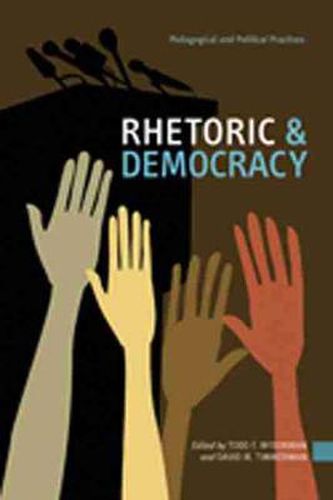Readings Newsletter
Become a Readings Member to make your shopping experience even easier.
Sign in or sign up for free!
You’re not far away from qualifying for FREE standard shipping within Australia
You’ve qualified for FREE standard shipping within Australia
The cart is loading…






From the Declaration of Independence to the Gettysburg Address, from Franklin Delano Roosevelt’s ‘Day of Infamy’ speech to John F. Kennedy’s inaugural address, it is no exaggeration to suggest that the ongoing American democratic revolution has been nourished by a rhetorical revolution of similar magnitude. The pioneering rhetorical scholar William Norwood Brigance noted in the early 1940s that American history has been driven by the power of rhetoric. Rhetoric and Democracy examines the complex relationship between rhetoric and democracy by demonstrating how rhetorical pedagogy, rhetorical practice, and rhetorical analysis support the creation of useful discourse among citizens.This book will be particularly valuable to students and scholars of rhetoric, especially in considering the birth, growth, and future of the discipline. Yet because it avoids excessive disciplinary jargon, the volume will prove useful to anyone who is interested in better understanding the indispensable role of rhetoric in democracy.
$9.00 standard shipping within Australia
FREE standard shipping within Australia for orders over $100.00
Express & International shipping calculated at checkout
From the Declaration of Independence to the Gettysburg Address, from Franklin Delano Roosevelt’s ‘Day of Infamy’ speech to John F. Kennedy’s inaugural address, it is no exaggeration to suggest that the ongoing American democratic revolution has been nourished by a rhetorical revolution of similar magnitude. The pioneering rhetorical scholar William Norwood Brigance noted in the early 1940s that American history has been driven by the power of rhetoric. Rhetoric and Democracy examines the complex relationship between rhetoric and democracy by demonstrating how rhetorical pedagogy, rhetorical practice, and rhetorical analysis support the creation of useful discourse among citizens.This book will be particularly valuable to students and scholars of rhetoric, especially in considering the birth, growth, and future of the discipline. Yet because it avoids excessive disciplinary jargon, the volume will prove useful to anyone who is interested in better understanding the indispensable role of rhetoric in democracy.